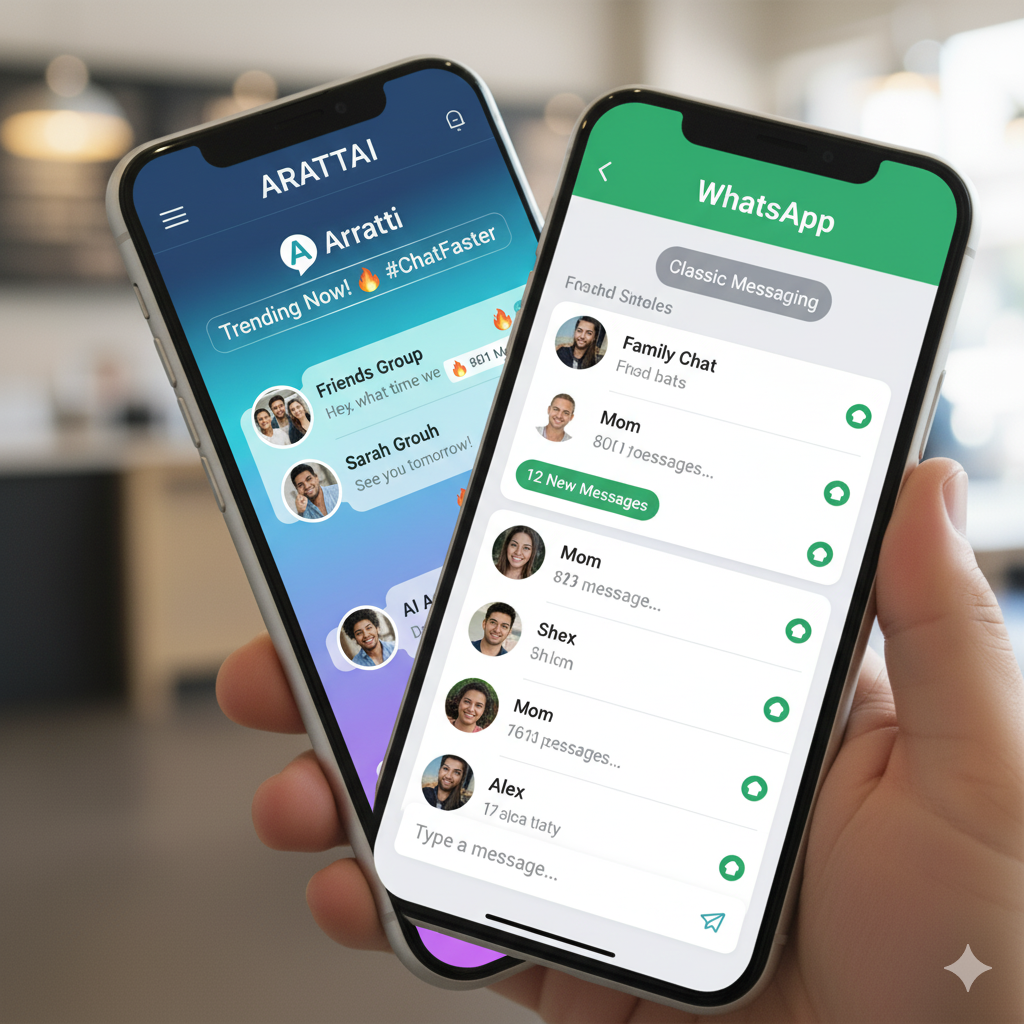When we talk about instant messaging in India, the first name that comes to everyone’s mind is WhatsApp. Over the years, it has become the default messaging app for millions of Indians, whether it’s for casual chats, family groups, business updates, or even payments. Its dominance is so strong that many people see it as the only option for daily communication.
But the user persona is slowly changing. With increasing concerns about data privacy, the need for local alternatives, and a growing push for homegrown digital solutions, new players are entering the scene. One such name that has started making noise is Arattai Messenger. Developed in India, Arattai is positioning itself as more than just another chat app it’s being seen as a true homegrown challenger to WhatsApp. Over the past months, it has been gaining attention and downloads, especially among users who want an Indian-made, secure, and feature-rich alternative for their communication needs.
The Rise of Arattai Messenger
Origins: Who built it & why
Arattai Messenger was created by Zoho Corporation, a Chennai-based Indian software company best known for its business and productivity tools. The app was first introduced in 2021, and its name “Arattai” comes from Tamil, meaning casual chat or chitchat. The idea was simple yet powerful: build a Made-in-India messaging app that is private, lightweight, and reliable, while also promoting the larger vision of Atmanirbhar Bharat (self-reliant India).
From the beginning, Zoho designed Arattai to focus on three things:
- Strong emphasis on privacy and data safety.
- Accessibility in multiple Indian languages so it feels native to everyone.
- Smooth usage even on low bandwidth or older smartphones, making it practical for the Indian market.
Recent Surge in Popularity
For the first couple of years, Arattai was quietly available but didn’t make big headlines. That changed recently. In just a matter of days, the app witnessed an explosive growth in downloads and sign-ups. What was earlier a few thousand daily registrations suddenly shot up to several lakhs per day. This 100x surge pushed Arattai to the top spots on app stores in India, briefly overtaking some global giants.
This rise wasn’t accidental—it came at the right time when conversations around data privacy, digital sovereignty, and supporting homegrown apps were already gaining momentum.
Government Support & Endorsements
One of the biggest catalysts for this growth was the open support Arattai received from Indian government ministers. Leaders from the Education and IT ministries publicly endorsed the app, highlighting it as a safe, secure, and India-made alternative to foreign messaging platforms.
This backing gave Arattai instant visibility and credibility. It also aligned perfectly with the government’s digital India and self-reliance initiatives, encouraging more people to try it out.
Who is Using Arattai?
The user base of Arattai is quite diverse:
- Patriotic users who want to actively support Indian alternatives.
- Privacy-conscious users looking for an app that promises security and local data storage.
- Non-metro and regional users who appreciate multilingual support and lightweight performance on modest internet speeds.
- Everyday families and businesses exploring a backup or alternative to WhatsApp.
Of course, the sudden surge also brought some growing pains. Users reported occasional OTP delays, syncing lags, and not all privacy features (like end-to-end encryption for all chats) are fully rolled out yet. Still, these challenges are common for apps scaling so quickly, and Zoho has been working on improvements.
Why This Matters
The rise of Arattai shows a shift in mindset. For years, India’s messaging space has been completely dominated by WhatsApp. Now, the success of a homegrown alternative suggests people are open to trying something new especially if it aligns with values like data privacy, digital independence, and supporting Indian innovation.
In short, Arattai isn’t just another messaging app. Its story reflects a growing demand for local solutions and a changing digital landscape in India.
Core Features: Arattai vs WhatsApp
Interface & Usability
- WhatsApp: Clean, simple, and familiar interface that almost everyone in India is comfortable with. It’s highly polished thanks to years of development and billions of users.
- Arattai: The interface feels quite similar to WhatsApp, so the learning curve is minimal. However, it adds some unique Indian touches and Zoho’s design language, which makes it stand out.
Unique Features in Arattai
Arattai isn’t trying to be a clone. It brings its own set of features designed for Indian users:
- Pocket: A personal space where you can save notes, links, or reminders—like chatting with yourself but more organized.
- Channels: Similar to Telegram channels, allowing one-to-many communication, useful for creators, brands, and communities.
- Meetings: Integrated video conferencing that feels more like Zoom/Google Meet, allowing groups to jump on calls without needing a separate app.
- Multi-device support: Arattai lets you use the same account on multiple devices at once, which is still limited on WhatsApp (although WhatsApp has started rolling this out too).
Regional Language Support & Device Performance
- Arattai: One of its strongest points. It supports multiple Indian languages, making it inclusive for people outside metros who prefer to chat in their mother tongue. It’s also optimized for lower-end devices and weaker networks, which makes it practical in rural or semi-urban India.
- WhatsApp: Supports several Indian languages too, but its heavy size and higher data consumption can sometimes feel demanding on older phones.
Limitations & What’s Missing
- Arattai: Still a young app, so a few features are either under development or not as smooth as WhatsApp. For example:
- End-to-end encryption for all chats is not fully rolled out yet.
- Ecosystem is small—most friends and family are still on WhatsApp, which limits network effects.
- Occasional performance hiccups like OTP delays or media syncing during peak times.
- WhatsApp: Feature-rich and highly stable, but doesn’t offer “Pocket” or integrated meetings. Its limitations are mostly around privacy concerns rather than usability.
Privacy, Security, and Data Sovereignty
- Encryption: WhatsApp uses end-to-end encryption (E2EE) by default for all personal and group chats, calls, and media. This is a global standard and one of its strongest privacy features.
- Data storage: User data can be stored on global servers (not necessarily in India). While messages are encrypted, metadata such as who messaged whom, when, and from where can still be collected.
- Privacy concerns: Owned by Meta (Facebook), WhatsApp has faced criticism for its data-sharing policies with its parent company. While content is secure, many users worry about how their metadata is used for advertising and tracking.
Arattai
- Encryption: Calls are end-to-end encrypted, but chat encryption is still being rolled out. This is one of the key gaps compared to WhatsApp.
- Data storage: A major selling point—Arattai claims to store user data within India, aligning with the idea of digital sovereignty and compliance with local laws.
- Privacy stance: Zoho has positioned itself as privacy-friendly, promising no spyware, no ads, and no sale of user data. However, since it’s a newer platform, users are waiting to see whether it can maintain these promises at scale.
User Experience and Accessibility
One of the biggest tests for any messaging app in India is how well it works across urban and rural contexts.
- Messaging & Media Sharing:
WhatsApp has long set the standard here—fast delivery, smooth media sharing, and reliable group messaging. Arattai performs well for texts and calls, but during peak load, some users have noticed slight delays in OTPs and media syncing. Still, it is designed to handle lower bandwidth, making it more forgiving in rural or semi-urban areas where network quality isn’t always stable. - Group Calls & Video:
WhatsApp supports large group calls with stability, but it consumes significant data. Arattai’s integrated “Meetings” feature is a smart addition, as it allows both casual and professional video calls without switching apps. However, call quality may dip in weaker connections compared to WhatsApp’s highly optimized infrastructure. - Accessibility for Affordable Devices:
Arattai shines here. It’s lightweight and optimized for older phones and weaker networks. WhatsApp, while efficient, has grown heavier over the years. For users with affordable devices, Arattai can feel snappier and more suited to everyday conditions in rural India.
Business Tools and Local Ecosystem Integration
- WhatsApp for Business has become a backbone for small businesses in India, enabling catalogs, automated replies, and customer communication.
- Arattai is still building this space but is positioning itself to integrate better with Indian businesses and creators. Its “Channels” feature gives local educators, community leaders, and content creators a platform to broadcast information without being drowned out by global noise.
- Zoho’s strong enterprise ecosystem could help Arattai link up with business tools, education apps, and even government communication platforms—something WhatsApp doesn’t offer as locally customized.
For example, schools or coaching centers in Tier-2 and Tier-3 cities may find Arattai’s local focus and Indian language support more useful than WhatsApp’s one-size-fits-all approach.
Challenges and Roadblocks
Arattai’s growth is impressive, but dethroning WhatsApp isn’t easy. Some hurdles include:
- Brand Loyalty – WhatsApp has been in India for over a decade and is deeply embedded in people’s daily lives. Shifting habits is one of the hardest battles in tech.
- Feature Gaps – Missing full end-to-end encryption on chats, occasional performance lags, and fewer integrations compared to WhatsApp.
- Competition from WhatsApp – Backed by Meta’s massive global infrastructure, WhatsApp can scale faster, fix issues quickly, and roll out features like payments, business catalogs, and AI-driven updates at a pace smaller players can’t match.
- Adoption Hurdles – Even if one person downloads Arattai, if their entire family, office, or friend group remains on WhatsApp, the switch feels inconvenient. The network effect keeps people locked in.
- Public Perception – While early adopters are excited, the general public still sees WhatsApp as more reliable and Arattai as “experimental.”
Will Arattai Dethrone WhatsApp?
Let’s break down the critical factors:
- Network Effect: WhatsApp dominates because “everyone is already there.” For Arattai to break this cycle, it needs mass adoption in entire communities or sectors (schools, government offices, or businesses).
- Trust: WhatsApp has encryption credibility but privacy concerns due to Meta. Arattai markets itself on trust, local data storage, and no ads—but it still has to prove itself at scale.
- Innovation: Features like Pocket, Meetings, and strong regional language support show Arattai can innovate beyond WhatsApp. But WhatsApp can (and often does) replicate competitor features quickly.
- Market Sentiment: Rising demand for Made-in-India apps and government endorsement works in Arattai’s favor. However, sentiment alone may not sustain usage if features or stability lag behind.
Expert & User Viewpoints
- Experts believe Arattai has the potential to become India’s second-biggest messaging app if it continues scaling and focuses on local strengths.
- Users who have tried it praise its lightness and unique features but often mention that “most of my contacts are still on WhatsApp,” showing the practical barrier to full migration.
Conclusion
Arattai Messenger represents more than just another chat app—it symbolizes India’s growing ambition to create self-reliant, privacy-focused, and locally built technology. Its rise shows that Indian users are willing to try homegrown alternatives when given the right mix of features and trust.
But dethroning WhatsApp is not an overnight task. WhatsApp’s massive network effect, global infrastructure, and brand familiarity make it an almost unbeatable rival in the short term.
Final Summary
- Arattai’s strength lies in innovation, local language support, data sovereignty, and government push.
- WhatsApp’s strength lies in its scale, polish, and global dominance.
So, is dethroning WhatsApp feasible? Not immediately. It’s more of a long-term possibility if Arattai can build trust, keep innovating, and carve out niches in education, business, and regional markets. For now, WhatsApp remains king, but Arattai has successfully positioned itself as the homegrown challenger to watch.
Discover more from PratsDigital
Subscribe to get the latest posts sent to your email.


